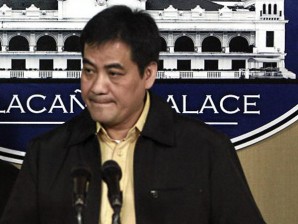Palace: Give K to 12 a chance
Malacañang on Tuesday appealed to the public to give the government a chance to implement the new K to 12 education program amid opposition from certain sectors because of the many problems in the public school system, including a massive classroom shortage.
“There will always be resistance to something new but we have to [at some point] implement the program … If not now, when do we do it?” said presidential spokesperson Edwin Lacierda.
The K to 12 program adds two years to the elementary and high school curriculum to give students needed job skills, should they not go on to college.
The program is being implemented in the Kindergarten, Grade 1 and Grade 7 levels this year. Grades 11 and 12, or senior high school, will be implemented in 2016.
The Department of Education started institutionalizing kindergarten for 5-year-olds under K to 12 last schoolyear. This year, the DepEd is introducing new curricula for Grades 1 and 7 (the new first year high school).
New curricula for other grade levels will be introduced in the succeeding years so that by June 2016, the DepEd can start implementing senior high school.
Severe shortage
Lacierda was commenting on complaints from teachers and other stakeholders that the government should not be implementing the new program now with the public school system facing so many problems like a severe classroom shortage.
Lacierda acknowledged the lack of classrooms, “but we cannot wait for the classrooms to be built before we implement the K to 12 program.”
He said the government was hoping to address the classroom shortage within the next two years. He said 50,000 classrooms needed to be built. He said 30,000 would be built through the Public-Private Partnership (PPP) program while the remaining 20,000 would be built by local government units.
Youth and teacher groups closely monitoring the K to 12 program said the government seemed ill-prepared for it and called for a halt to its implementation.
Benjo Basas, chair of Teachers’ Dignity Coalition (TDC), said DepEd reports from the field showed a “generally orderly” class opening on Monday, except for major problems in public schools offering kindergarten.
Shift scheduling
At Longos Elementary School, for instance, the surge in kindergarten enrollment amid a lack of classrooms forced the school to hold classes in five shifts.
Ten kinder sections currently take turns holding classes in two classrooms. The shift scheduling also shortened kinder classes from three hours to only two hours a day.
Basas said the persistent problems at the school opening this year showed the government was not yet prepared to roll out K to 12 nationwide.
“It was a huge gamble for the DepEd. But the willingness and sincerity to implement are not enough if you do not have the capacity,” said Basas.
The Alliance of Concerned Teachers (ACT) also criticized the implementation of K to 12 without adequate funding and with its enabling law still to be passed. The current education law mandates the government to provide free basic education only for 11 years.
“The prevailing education crisis must be addressed more fundamentally and the K to 12 program, [President Aquino’s] supposed legacy to the Filipino people, would only exacerbate the situation,” said ACT secretary general France Castro.
Not the solution
Kabataan party-list Representative Raymond Palatino said K to 12 would not solve the problems of the current 10-year education cyle.
He said government spending for education continued to fall short of levels recommended by the United Nations, which is 6 percent of the gross domestic product. But Philippine spending in the past few years barely reached 3 percent of GDP.
Meanwhile, idled buildings and abandoned offices owned by the government may soon be used to address the classroom shortages, according to DepEd Assistant Secretary Jesus Mateo.
At the weekly forum hosted by the Catholic Media Network on Tuesday, Mateo said the department was seriously looking into turning underutilized or unused government facilities into classrooms.
He said the department was looking at daycare centers, village centers and barangay halls which were not being “maximized to [their] fullest.” With a report from Jocelyn Uy















